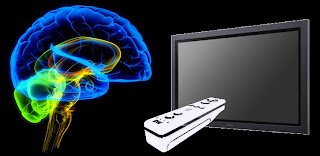Do we need really this blog?
 This is my first post and the question arises... Do we really need it? Well, today the use of games in rehabilitation is a very hot topic, and there is a lot of information available about it. However, very "similar" approaches in this field have substantial underlying conceptual differences: not every game used in science is a serious game; not every rehabilitation approach is neuroscientifically grounded; and not every combination of these guarantees a better outcome. I will use this blog to discuss these aspects, post relevant findings, links or even my own research initiatives.
This is my first post and the question arises... Do we really need it? Well, today the use of games in rehabilitation is a very hot topic, and there is a lot of information available about it. However, very "similar" approaches in this field have substantial underlying conceptual differences: not every game used in science is a serious game; not every rehabilitation approach is neuroscientifically grounded; and not every combination of these guarantees a better outcome. I will use this blog to discuss these aspects, post relevant findings, links or even my own research initiatives.Being an engineer by training, I doubt that I ever meant to end up doing a PhD in neuroscience. But it happened, and I'm most glad it did. My journey is that of the one that realizes that things some times happen for good reason. I was trained in telecommunications to be able to design complex information and communication systems. I have worked modelling the activity of biological neural networks just like the ones that populate our brains to create "artificial brains". I have worked building robots that move about in order to understand if my "artificial brains" did make any sense. I have worked developing and deploying interactive installations, using virtual reality and mixed reality systems. BUT... none of it felt complete, the right thing to do. In this journey of about a decade, I have been exposed to extremely multidisciplinar environments that allowed me to appreciate the role of about ANY discipline, from arts to exact sciences, and of course, learn from them. The turn-point happened when I started working on this project involving Virtual Reality, Interactive Systems and Neuroscience. I was already acquainted with these three domains, but I had never put them together. And here is where the magic moment comes. All of a sudden, all my fragmented background made complete sense and I could see it consistent, and I could see a reason.
Our brain is a magic box that can trick us a times with metal constructs or illusions. Our unconscious processing and machinery can make us believe - in its quest for meaning - what doesn't exist. Neuroscience is just starting to scratch the surface of how our brain works, but can tell us already many things. For instance, it can help us understanding some of the recovery mechanisms after a brain lesion, and how to exploit those by utilizing unconscious brain mechanisms. Unfortunately, with only few exceptions, conventional therapies have very indirect access to the brain. This is the reason why many of these mechanisms for brain recovery are not yet fully exploited.
On the other hand, it is in the human nature, and also in that of so many animals, to spend part of our life "playing". Apparently, playing is an appealing thing to our brain. In the not so far removed past, and even sometimes nowadays, playing has been negatively seen as a waste of time. At some point, it was even assumed that the only basis of learning was negative reinforcement. Now we know that it is not all of it. Games are used in nature by many species to transmit knowledge from generation to generation. Games are used to practice skills that will become relevant at a later stage of life. Many research studies demonstrate its priceless value in learning social values, skills, etc. Designing a game is definitely not a game, there is so much thinking into it to deliver the appropriate experience and transmit the appropriate story and content...
The outstanding thing is when games become the solution that can exploit the combination of virtual reality, interactive technologies and neuroscience to conveniently "trick" our brains beyond what was possible up to now, and yet for a very good reason, i.e. rehabilitation.


Comments